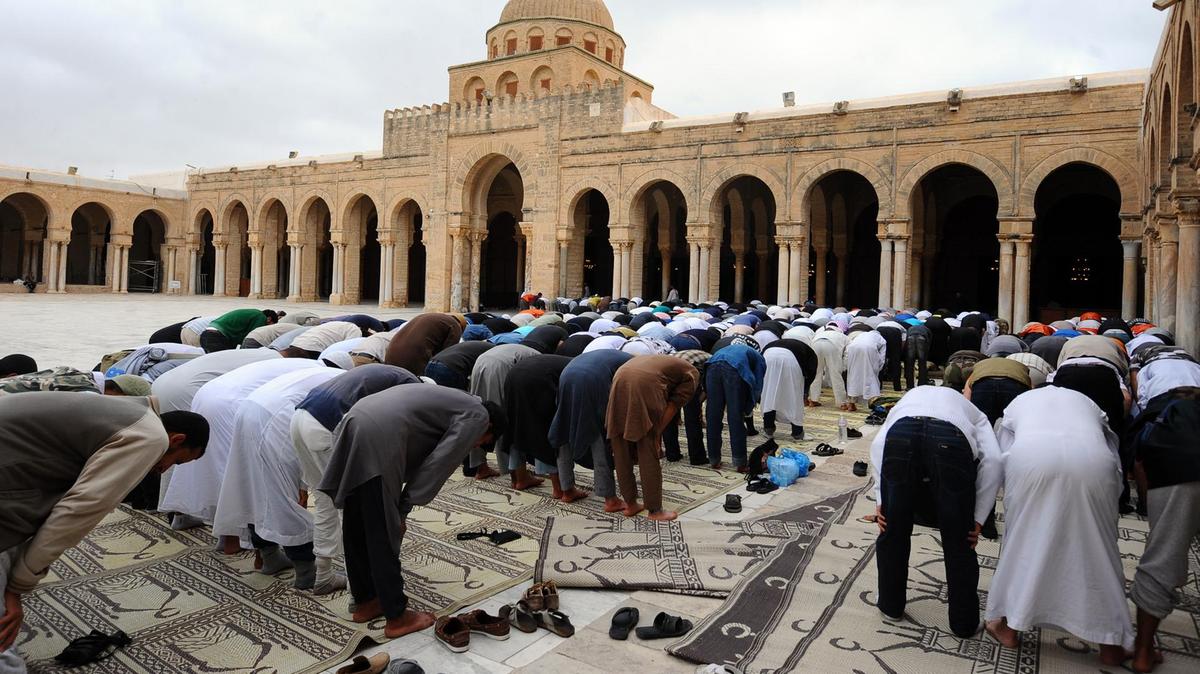The usual stream of visitors to the historical Great Uqba Mosque was cut off by the pandemic last year

On the eve of Ramadan, Nasal Dabousi stood on the roof of his carpet shop overlooking the massive marble courtyard of Kairouan’s Great Uqba Mosque, and worried aloud about new government Covid restrictions.
“They keep changing their minds about what is and isn’t allowed,” he said, “so no one is making plans to come here. That’s very, very bad.”
“Last year,” he added, “the mosque was closed for three months, and the economy went to zero.”
Kairouan is the fourth-holiest city in Islam, and the heart of the faith in North Africa. Every year the Great Mosque, with its marble columns with carved capitals pillaged from Roman ruins at Carthage, and hulking square minaret, draws close to 4 million pilgrims and visitors, with many arriving during Ramadan. Those visitors are the heart of Kairouan’s economy.

In addition to spending on hotels and restaurants in the Unesco World Heritage medina, visitors indulge in Kairouan’s rich culture of craftsmanship, snapping up finely woven textiles and hand-knotted carpets from the artisans and dealers around the old medina.
“It’s common for visiting patrons to purchase a Kairouan carpet and donate it to the mosque,” explained Moncef Houarbi, a local historian whose family has lived in Kairouan for hundreds of years.
Habib Memni, a carpet dealer in Kairouan, said 2019 was a banner year for sales as tourism increased, but that everything crashed last year when Tunisia went into a three-month lockdown, which included Ramadan.
“With coronavirus, we are terrified we won’t have a future,” he said.
That months-long lockdown, and the global slowdown in tourism, has sent Tunisia into an economic spiral. Tourism accounts for nearly $2 billion of Tunisia’s GDP or roughly 8 percent.
This year, despite the third wave of infections gripping Tunisia, the government has relaxed restrictions and allowed mosques to open from 5 am to 10 pm. Many in Kairouan hope that will bode well for the return of pilgrims and tourists alike.
Their return may ease economic worries in Kairouan, but it has also put many residents, including Mr. Memni, on edge.
“Even though I’ve been vaccinated,” he said, “I am still worried about so many people visiting and getting sick.”
Even though I’ve been vaccinated,” he said, “I am still worried about so many people visiting and getting sick
Habib Memni, carpet seller
Tunisia is groaning under the strain of Covid-19, with the emergence of new variants and a generally lax attitude towards restrictions. In the past week, several hospitals around the nation have reached capacity, according to Nissaf Ben Alaya, the director-general of the National Observatory for New and Emerging Diseases.
She pleaded with Tunisians to wear a mask and respect social distancing, but at the same press conference, Prime Minister Hichem Mechichi announced the nightly curfew would be moved back to 10pm from 7pm, a move many see as bowing to pressure to allow people to congregate for evening iftars.
Souhail Ataahil, a security guard at the Great Mosque, says the balance between letting the faithful worship and maintaining health restrictions is delicate.
“We are only supposed to allow half capacity,” he said, “but when people travel from all over the country to pray at the mosque, you can’t just turn them away.”
Inside the mosque, taped to the green and grey marble pillars are signs encouraging the faithful to “Respect God and care for our community” by following health measures like wearing a mask, bringing their own prayer rugs, and performing ablutions at home before coming to pray.
As the call for the first Dhuhr, or afternoon, prayer of Ramadan sounded, a handful of men trickled into the expansive prayer hall, and a few others mingled in the courtyard. Many of Kairouan’s faithful would be praying at home as they did last year, Mr Ataahil said.
But he is unsure what will happen during the final week of Ramadan, when thousands of pilgrims usually throng the courtyard of the mosque each night, lingering for hours.
“Covid has been universally bad for business, and the tough economic situation makes it difficult for people to travel,” he said, “but Inshallah all will be well in Kairouan this Ramadan.”
Published: April 17, 2021 03:37 AM



